Ashka Jhaveri, Andie Parry, Brian Carter, Annika Ganzeveld, and Frederick W. Kagan
The Iran Update provides insights into Iranian and Iranian-sponsored activities abroad that undermine regional stability and threaten US forces and interests. It also covers events and trends that affect the stability and decision-making of the Iranian regime. The Critical Threats Project (CTP) at the American Enterprise Institute and the Institute for the Study of War (ISW) provides these updates regularly based on regional events. For more on developments and in Iran and the region, see our interactive map of Iran and the Middle East.
CTP and ISW have refocused the update to cover the Israel-Hamas war. The new sections address developments in the Gaza Strip, the West Bank, Lebanon, and Syria, as well as noteworthy activity from Iran’s Axis of Resistance. We do not report in detail on war crimes because these activities are well-covered in Western media and do not directly affect the military operations we are assessing and forecasting. We utterly condemn violations of the laws of armed conflict and the Geneva Conventions and crimes against humanity even though we do not describe them in these reports.
Key Takeaways:
1. Israeli ground forces advanced along the northwestern Gazan coast amid reports of clashes with Hamas in the area. The IDF continued its advance into Tal al Hawa on November 5.
2. Clashes between Palestinian militants and Israeli forces in the West Bank continued at their usual rate on November 5, indicating that November 4’s calls for uprisings across the West Bank failed to materialize.
3. Lebanese Hezbollah (LH) and other Iranian-backed militants continued cross-border attacks into northern Israel on November 5 at their normal rate.
4. Iranian-backed Iraqi proxy militia Kataib Hezbollah threatened to escalate attacks against US forces in Iraq and to target “US regional interests” ahead of Blinken’s visit to Iraq, which indicates that Iran and its proxies and partners may target US interests outside of Iraq and Syria.
5. Hamas Political Bureau Chairman Ismail Haniyeh discussed the Israel-Hamas war with Supreme Leader Ali Khamenei in Tehran on November 5.
Gaza Strip
Axis of Resistance campaign objectives:Erode the will of Israeli political establishment and public to launch and sustain a major ground operation into the Gaza Strip
Degrade IDF material and morale around the Gaza Strip
Israeli ground forces advanced along the northwestern Gazan coast amid reports of clashes with Hamas in the area. IDF spokesman Rear Admiral Daniel Hagari said Israeli ground forces have fully encircled Gaza City and split the whole Gaza Strip into two.[1] The al Qassem Brigades—the militant wing of Hamas—released footage of its militants operating in or around the al Shati Refugee Camp.[2] Independent analyst on X (Twitter) geolocated the footage to the Ahmed Oraby road north of the al Shati camp.[3] The footage shows militants launching rocket propelled grenades (RPGs) at IDF tanks.[4] Both the al Quds Brigades—the militant wing of the Palestinian Islamic Jihad (PIJ)—and the Al Aqsa Martyrs’ Brigade said they targeted Israeli vehicles in northwestern Gaza on November 5.[5]
The IDF is continuing its advance in Beit Hanoun in the northeastern Gaza Strip. The al Qassem Brigades—the militant wing of Hamas—published footage of its militants maneuvering through tunnel systems in Beit Hanoun and attacking IDF forces with various weapons on November 4.[6] A Palestinian journalist said that the IDF clashed with Hamas forces on al Karamah Street, the main north-south street in Beit Hanoun, on November 4.[7]
Hamas fired mortars targeting Israeli military vehicles west of the Erez military checkpoint on November 5, possibly as part of an effort to harass and disrupt Israeli ground lines of communication there.[8] Israeli forces crossed into the Gaza Strip at and near Erez on October 29 and Hamas will likely continue to attack this and other IDF crossing points and the roads leading from them.[9]
IDF spokesperson Daniel Hagari released videos and pictures showing how Hamas uses the Indonesian Sheikh Hamad Hospital for military operations.[10] The videos show Hamas militants firing small arms at the IDF from the hospital.[11] Another video shows a tunnel shaft that the IDF says connects to a tunnel network underneath the hospital.[12] CTP-ISW previously reported that the Wall Street Journal published a map of the tunnel system that Hamas has created below the Gaza Strip, which includes a system underneath Beit Hanoun.[13]
The IDF continued its advance into Tal al Hawa on November 5. The Al Qassem Brigades claimed that it defended against Israeli advances from southwest of Tal al Hawa.[14] The National Resistance Brigades—the military wing of the Democratic Front for the Liberation of Palestine—mortared Israeli forces and fired anti-tank rockets at advancing Israeli vehicles southeast of Zaytoun neighborhood and south of Gaza City on November 5.[15] The Al-Aqsa Martyrs Brigades also mortared Israeli vehicles entering the al Samouni area near Zaytoun.[16]
Al Qassem Brigades and the al Aqsa Martyrs’ Brigades mortared advancing Israeli forces east of Juhor ad Dik, which is close to where Israeli forces entered the central Gaza Strip at the beginning of the ground operation.[17] Local sources claimed Hamas fighters ambushed an Israeli military unit in the western outskirts of Netzarim, west of Juhor ad Dik.[18] Israeli forces south of the Gaza Strip are continuing to undertake clearing operations. Fighting behind the Israeli forward line of advance is consistent with the doctrinal definition of ”clear,” which is a tactical task that ”requires the commander to remove all enemy forces and eliminate organized resistance within an assigned area.” IDF Spokesman Rear Adm. Daniel Hagari stated on November 5 that the IDF will still allow civilians to leave north Gaza and head south.[19]
Palestinian militias in the Gaza Strip conducted indirect fire attacks into Israeli territory, primarily in southern Israel. The al Qassem Brigades claimed responsibility for four indirect fire attacks into the areas immediately adjacent to the Gaza Strip, and for two attacks targeting Tel Aviv.[20] The al Quds Brigades claimed responsibility for 12 indirect fire attacks on November 5.[21] The al Quds Brigades’ indirect fire primarily targeted Israeli towns adjacent to Gaza and North Gaza governorates in the northern Gaza Strip. Lebanese Hezbollah (LH)-aligned media also reported that unspecified militants fired anti-tank guided missiles at Israeli forces near Kissufim on November 4.[22]
Hamas condemned the Israeli Heritage Minister’s suggestion that Israel could use a nuclear weapon on the Gaza Strip. Israeli Heritage Minister Amichai Eliyahu made the comment in a radio interview.[23] Israeli Prime Minister Benajamin Netanyahu condemned the comment and suspended Eliyahu from participation in cabinet meetings.[24] Hamas called on the United Nations and international community to take the statement seriously and warned that the statement will ignite the region.[25]
Al Qassem Brigades spokesperson Abu Ubaida claimed that Israeli airstrikes have killed 60 Israeli hostages, which is consistent with a Hamas information campaign that seeks to prepare the information environment to blame Israel for the possible deaths of hostages.[26] Netanyahu restated that there will not be a ceasefire without the return of Israeli hostages.[27] Hamas political bureau member Khalil al Hayya said on November 5 that Israel and Hamas were on the verge of an agreement to release hostages, but the negotiations are now back to square one.[28]
Recorded reports of rocket attacks; CTP-ISW cannot independently verify impact.
Recorded reports of rocket attacks; CTP-ISW cannot independently verify impact.
West Bank
Axis of Resistance campaign objectives:Draw IDF assets and resources toward the West Bank and fix them there
Clashes between Palestinian militants and Israeli forces in the West Bank continued at their usual rate on November 5, indicating that November 4’s calls for uprisings across the West Bank failed to materialize. CTP-ISW recorded 13 clashes in the West Bank, including several hours of continual fighting in Jenin.[29] CTP-ISW also recorded five instances of Palestinian militants conducting IED attacks in the West Bank.[30] The IDF recovered multiple IEDs planted on roads in Jenin.[31] IDF raids across the West Bank likely contributed to the number of armed clashes.[32] CTP-ISW recorded six anti-Israel demonstrations on November 5.[33]
Israeli security forces killed an ISIS operative in a raid on November 5 in Abu Dis, near Jerusalem.[34] Israel released the operative from prison in July 2023. The ISIS fighter was recruiting a small cell to conduct small arms attacks against Israeli forces.
US Secretary of State Antony Blinken met with Palestinian Authority President Mahmoud Abbas in Ramallah on November 5 to discuss a post-Hamas Gaza, the Israel-Hamas War, and humanitarian aid.[35] Abbas said that Gaza is “an integral part” of a future Palestinian state, but noted that the Palestinian Authority will assume its responsibilities within a “comprehensive political solution” applying to both the West Bank and Gaza.[36] Abbas emphasized the need for an “immediate ceasefire” and added that humanitarian aid must be allowed into Gaza.[37] A US State Department spokesperson said that Blinken told Abbas that the United States is committed to restoring essential services in Gaza and “getting aid into Gaza.”[38] The spokesperson added that Blinken expressed his commitment to “the realization of the Palestinians’ legitimate aspirations” for a Palestinian state.[39]
Palestinian militant groups, including Hamas and the Palestinian Islamic Jihad (PIJ), continued to call for uprisings against Israel in the West Bank. Palestinian militant groups have repeatedly called for demonstrations and attacks since October 7, but the calls have so far failed to generate widespread protests or attacks. PIJ called for “comprehensive confrontation” with the IDF.[40] Separately, Hamas called for demonstrations to “pressure” Israel in response to Israeli treatment of Palestinian prisoners.[41] A militia with members in the Palestinian security services gave a 24-hour deadline for Abbas to declare a confrontation with the IDF.[42] The militia said it will rebel against the Palestinian Authority if its demands are not met.
This map is not an exhaustive depiction of clashes and demonstrations in the West Bank.
Southern Lebanon and Golan Heights
Axis of Resistance campaign objectives:Draw IDF assets and resources toward northern Israel and fix them there
Set conditions for successive campaigns into northern Israel
Lebanese Hezbollah (LH) and other Iranian-backed militants continued cross-border attacks into northern Israel on November 5 at their normal rate. LH claimed nine attacks out of the 10 conducted on Israeli military and communications points along the border.[43] Lebanese Hezbollah launched rockets at Kiryat Shmona on November 5 in retaliation for an Israeli airstrike that killed four Lebanese civilians.[44] The IDF intercepted two drones attempting to cross into Israeli airspace, one over southern Lebanon and one near Matat in northern Israel.[45] Israeli forces continued retaliatory attacks targeting the sites in Lebanon that militants used to launched projectiles into Israel.[46]
Political Bureau Head of the Islamic Group in Lebanon Ali AbI Yassin stated that his group’s military wing, the Fajr Forces, would participate in a war with Israel in support of Gaza on November 5, which is consistent with the group’s previous statements and activity.[47] The Fajr Forces claimed one rocket attack into northern Israel on October 18.[48] The Sunni armed group operates in southern Lebanon and made a resurgence during the Israel-Hamas war after almost 20 years of dormancy. The deputy head of the Islamic Group’s political bureau said on October 30 that the group is not in complete alignment with LH but that the group supports LH in terms of resistance.[49] LH almost certainly permits militant groups operating in southern Lebanon, such as the Fajr Forces, to conduct attacks from southern Lebanon given the extent to which LH controls the area.
Iran and Axis of Resistance
Axis of Resistance campaign objectives:Demonstrate the capability and willingness of Iran and the Axis of Resistance to escalate against the United States and Israel on multiple fronts
Set conditions to fight a regional war on multiple fronts
The Islamic Resistance in Iraq—an umbrella group of Iranian-backed Iraqi militias—claimed responsibility for one attack targeting US forces in Syria on November 5. This Islamic Resistance in Iraq said it launched one drone targeting US forces at Tal Baidar, west of Hasakah city, Syria.[50] The group has not previously targeted this position. Local Syrian sources reported that US forces shot down an unspecified drone near the base.[51] The Islamic Resistance in Iraq has claimed 33 attacks targeting US forces in the Middle East since October 18. CENTCOM has not commented on the November 5 attack at the time of publication.
US Secretary of State Antony Blinken met with Iraqi Prime Minister Mohammed al Sudani on November 5 in Baghdad to discuss threats to US forces. Blinken said that he “made very clear” that attacks on US positions in Iraq are “totally unacceptable” and that the United States will “take every necessary step to protect our people” during the meeting with Sudani.[52] Iraqi government sources told an Iraqi Fayli Kurdish outlet on November 4--notably before Blinken’s travel was publicly announced--that Blinken would visit Baghdad on November 5 and that the meeting between Blinken and Sudani would focus on attacks against US forces.[53] The source claimed that Blinken would deliver a warning that the United States will respond to attacks on US forces, presumably within Iraq.[54] Retaliation against Iranian-backed groups in Iraq would be a break from the Biden Administration’s pattern of striking targets in Syria in response to Iranian-backed attacks in Iraq.[55] US aircraft struck an IRGC-affiliated compound on October 26 in Syria in response to Iranian-backed attacks in Iraq.[56]
Iranian-backed Iraqi proxy militia Kataib Hezbollah threatened to escalate attacks against US forces in Iraq and to target “US regional interests” ahead of Blinken’s visit to Iraq, which indicates that Iran and its proxies and partners may target US interests outside of Iraq and Syria. Kataib Hezbollah spokesperson Abu Ali Askari said on November 4—notably before Blinken’s travel was publicly announced—that Kataib Hezbollah would “work to end” the US presence in Iraq and “disable US regional interests” if the United States continued to support Israel’s ground operation in Gaza.[57] Kataib Hezbollah has the capabilities to target the US interests in the Arab Gulf states and has targeted US allies in the Gulf previously.[58] A Kataib Hezbollah-linked militia group targeted Saudi oil infrastructure in 2019 and in 2021.[59] Iran is also more likely to choose Kataib Hezbollah to target US interests regionally because the Yemeni Houthi movement is less likely to target US assets in the Arab Gulf states due to the Houthis’ ongoing peace efforts with Saudi Arabia.[60]
The Iranian foreign affairs minister discussed the Israel-Hamas War with the Iraqi foreign minister ahead of the Iraqi prime minister’s visit to Tehran on November 6. Iranian Foreign Affairs Minister Hossein Amir Abdollahian discussed the Israel-Hamas war in a phone call with his Iraqi counterpart Fuad Hossein on November 4.[61] Abdollahian warned that the United States’ “growing violence” against civilians in the Gaza Strip will “inevitably” cause the war to expand. Iranian media separately reported on November 5 that Iraqi Prime Minister Mohammad Shia al Sudani will travel to Tehran on November 6.[62] Sudani’s visit comes on the heels of his meeting with the US secretary of state.
Hamas Political Bureau Chairman Ismail Haniyeh discussed the Israel-Hamas war with Supreme Leader Ali Khamenei in Tehran on November 5.[63] Haniyeh and Khamenei discussed “the latest developments” in the Gaza Strip and the West Bank. Khamenei reiterated Iran’s support for Palestinian resistance groups and praised Gazans’ “patience and endurance.” Khamenei condemned the United States’ support for Israel and called on Islamic governments to support Palestinians in the Gaza Strip. Iranian officials have engaged with senior Hamas leadership on numerous occasions since October 7. Foreign Affairs Minister Hossein Amir Abdollahian has discussed the war with Haniyeh on four separate occasions since October 7, for example.[64]
Iranian Defense and Armed Forces Logistics Minister Brigadier General Mohammad Reza Ashtiani warned the United States on November 5 that it will suffer “heavy blows” if it does not immediately halt attacks on the Gaza Strip and implement a ceasefire. Ashtiani’s warning is part of Iran’s ongoing efforts to deter the United States from providing further military support to Israel.[65] His warning is also consistent with previous Iranian claims that the United States is “directing” Israel’s war against Hamas.[66] Other Iranian military officials have issued similar warnings to the United States in recent weeks. IRGC spokesperson Brigadier General Ramazan Sharif recently warned the United States in an interview with LH-affiliated al Mayadeen on October 28 that “those who cannot reach Israel [in battle] may be able to reach the US forces that are managing this war,” as CTP-ISW previously reported.[67]
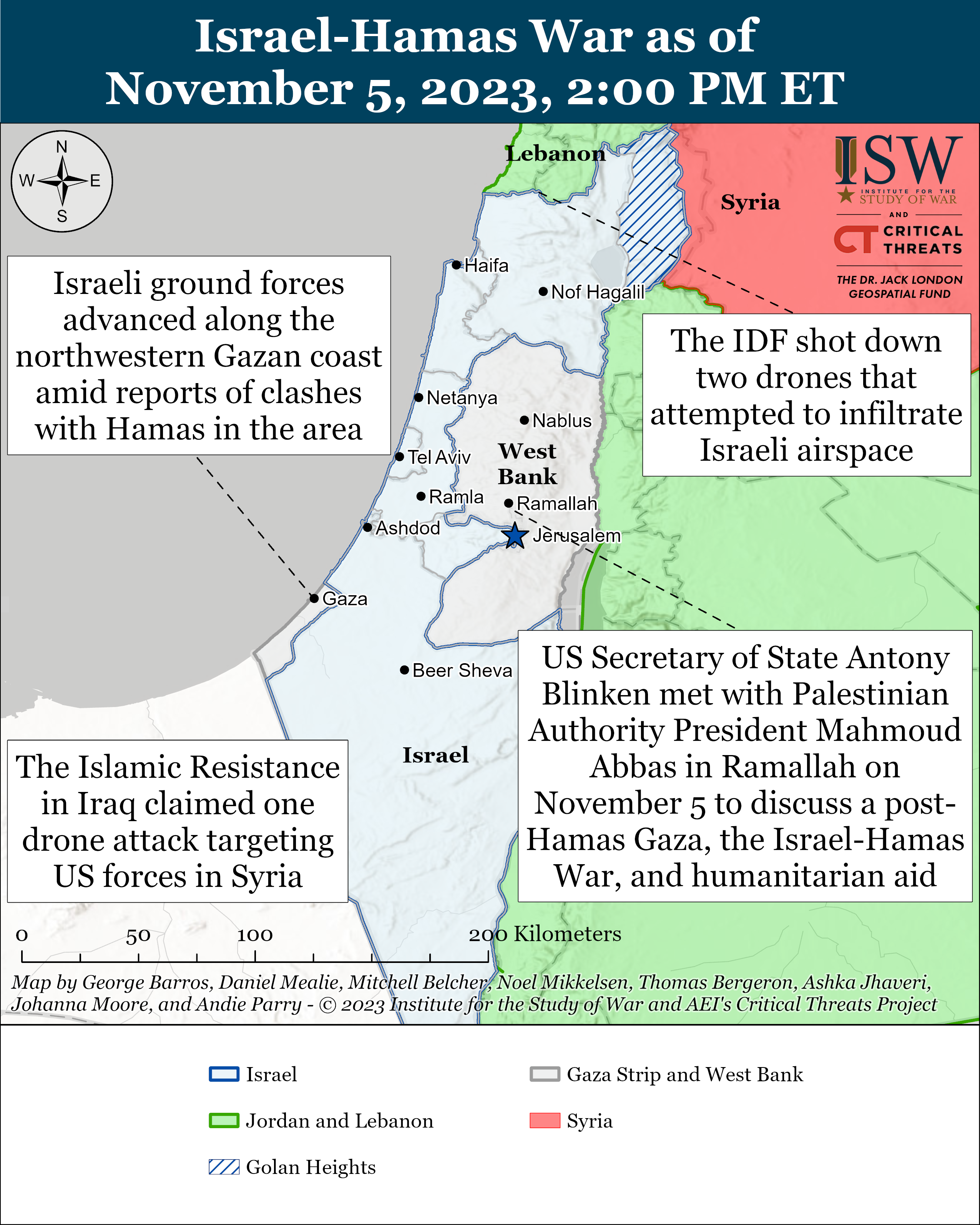
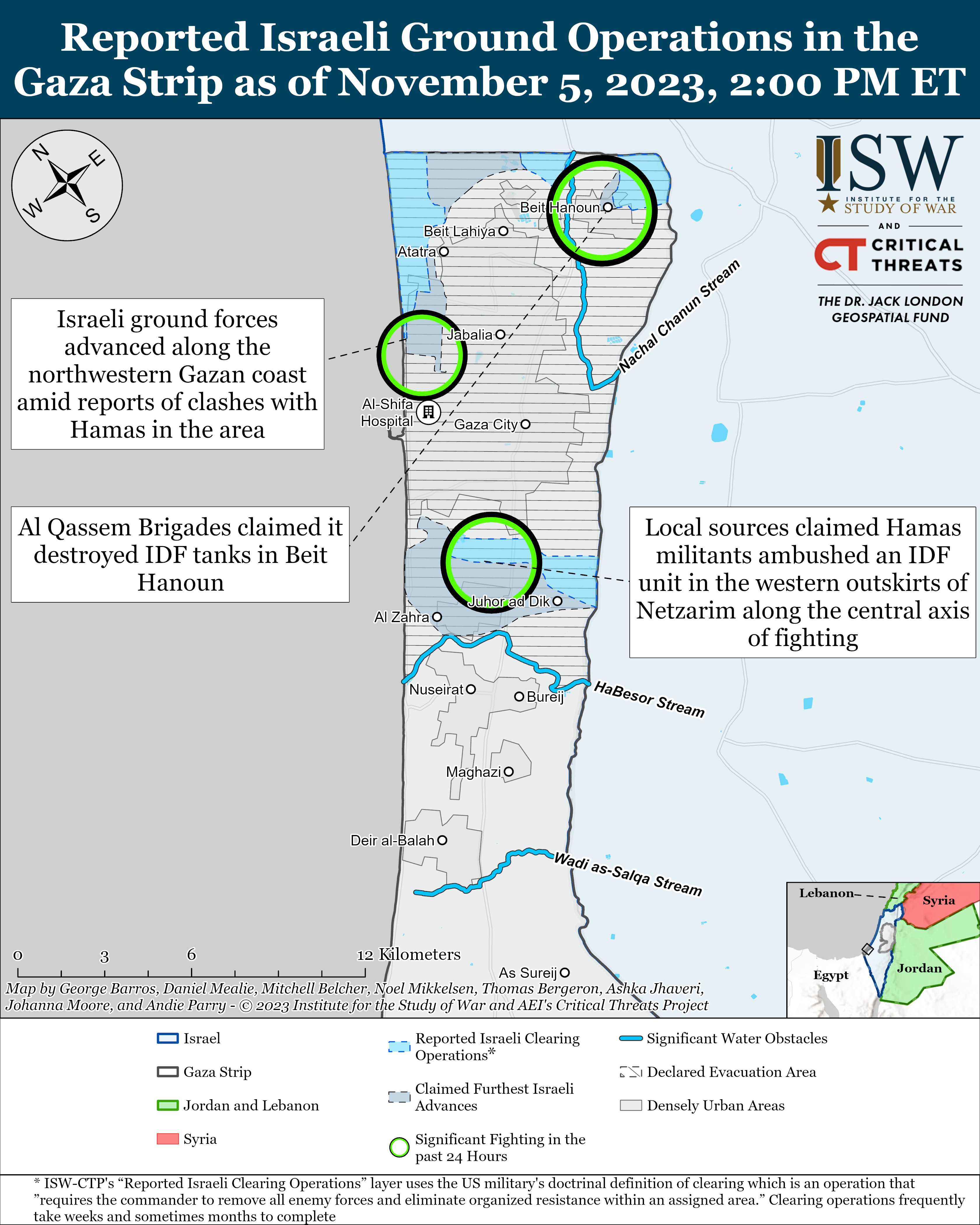
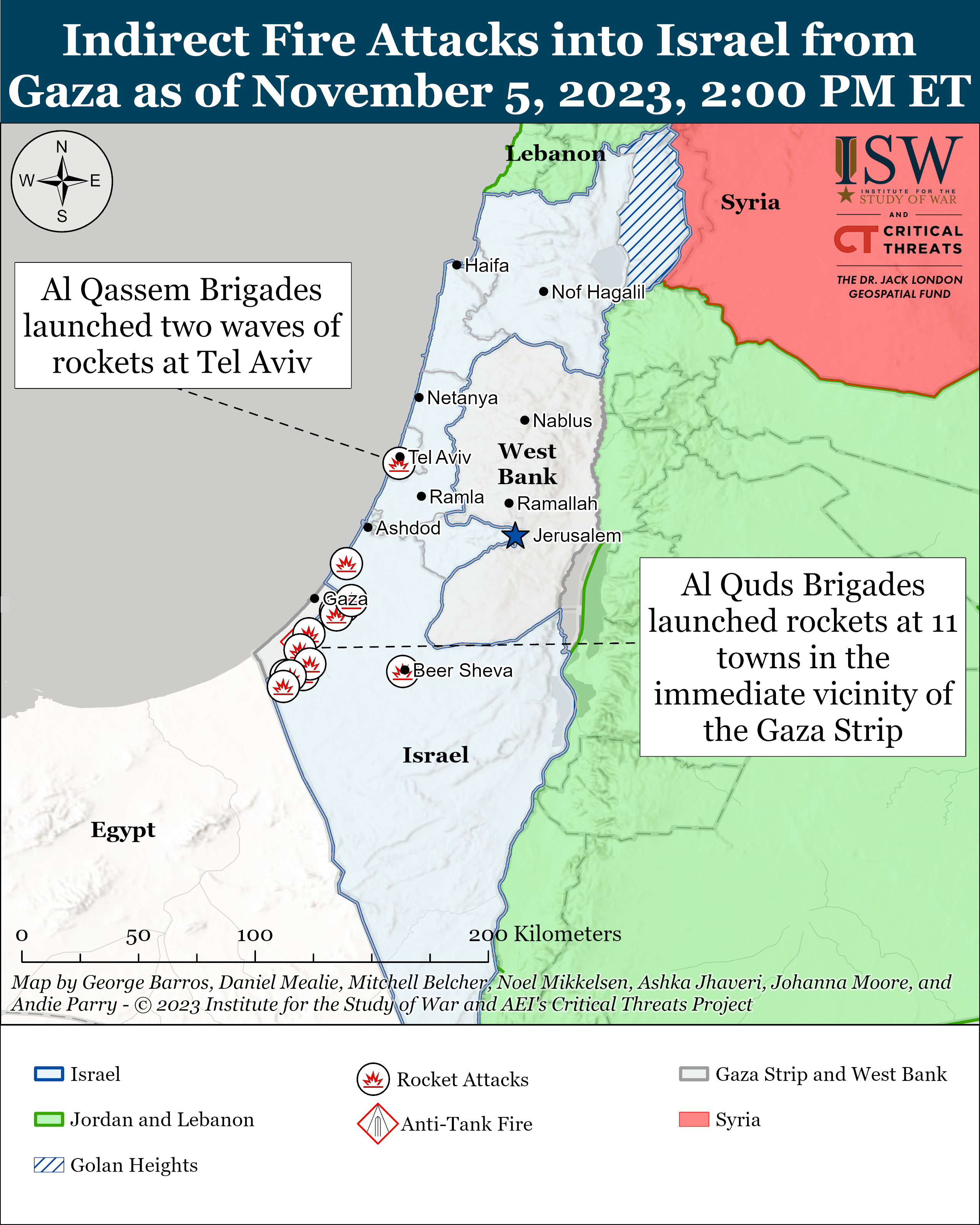
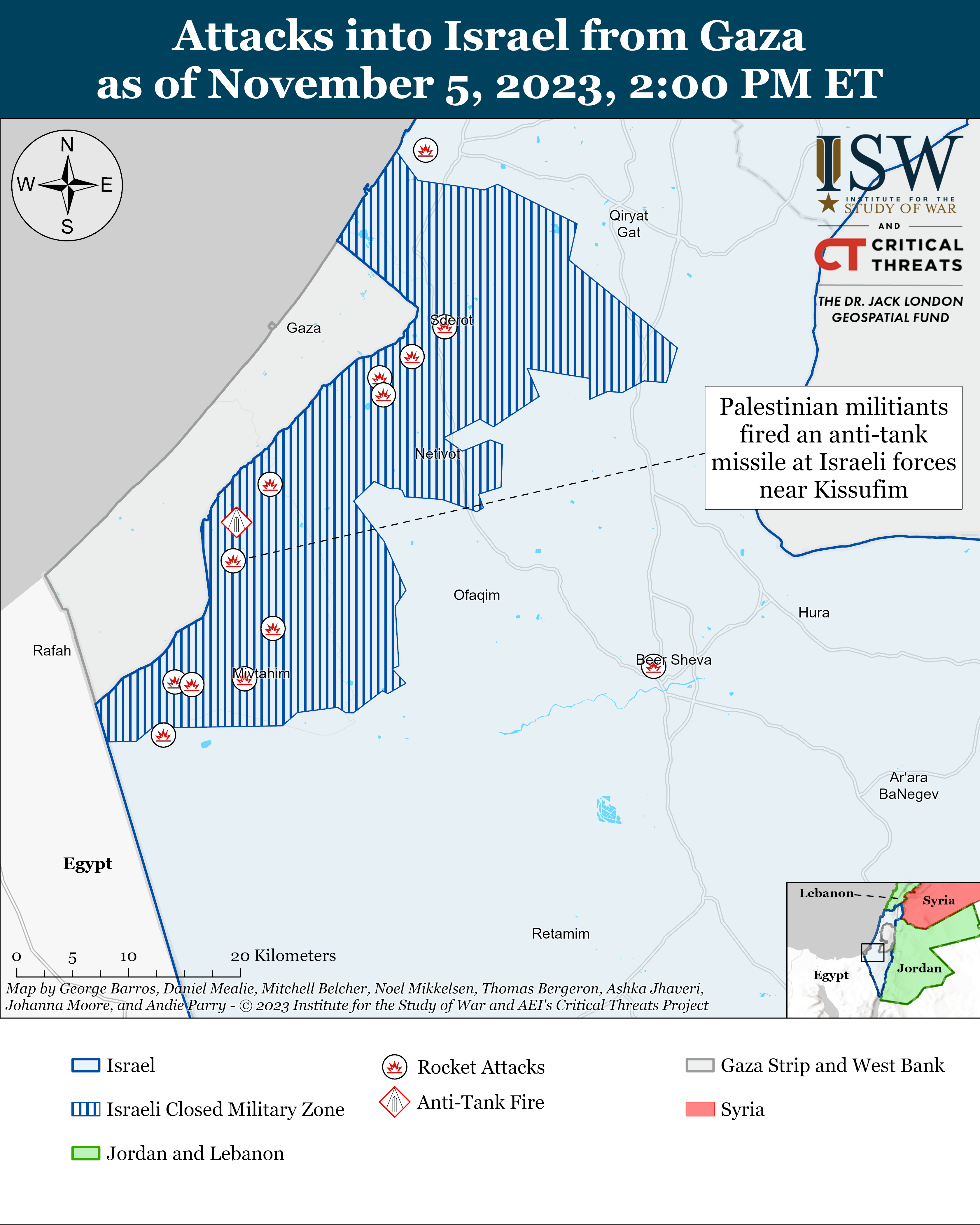
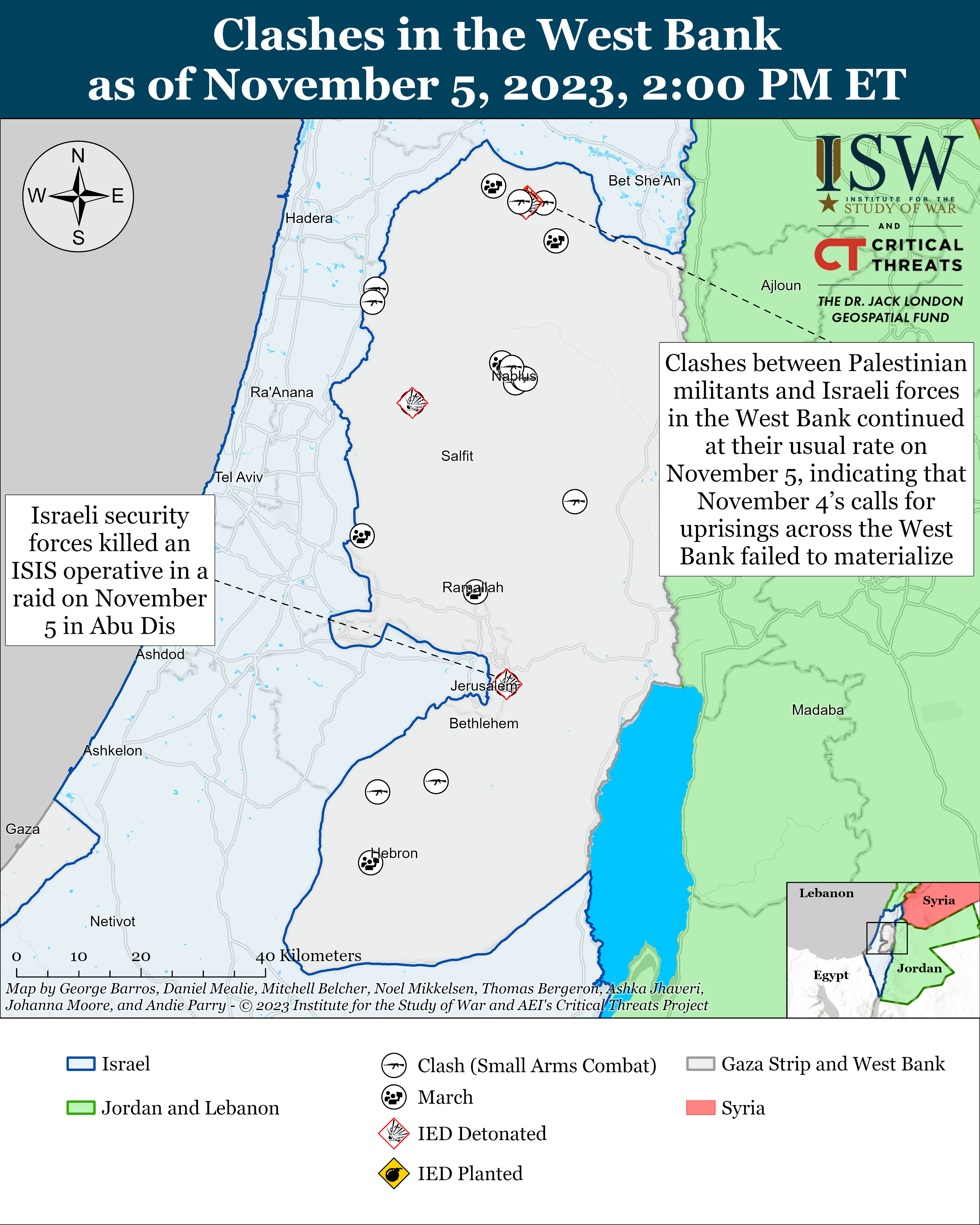
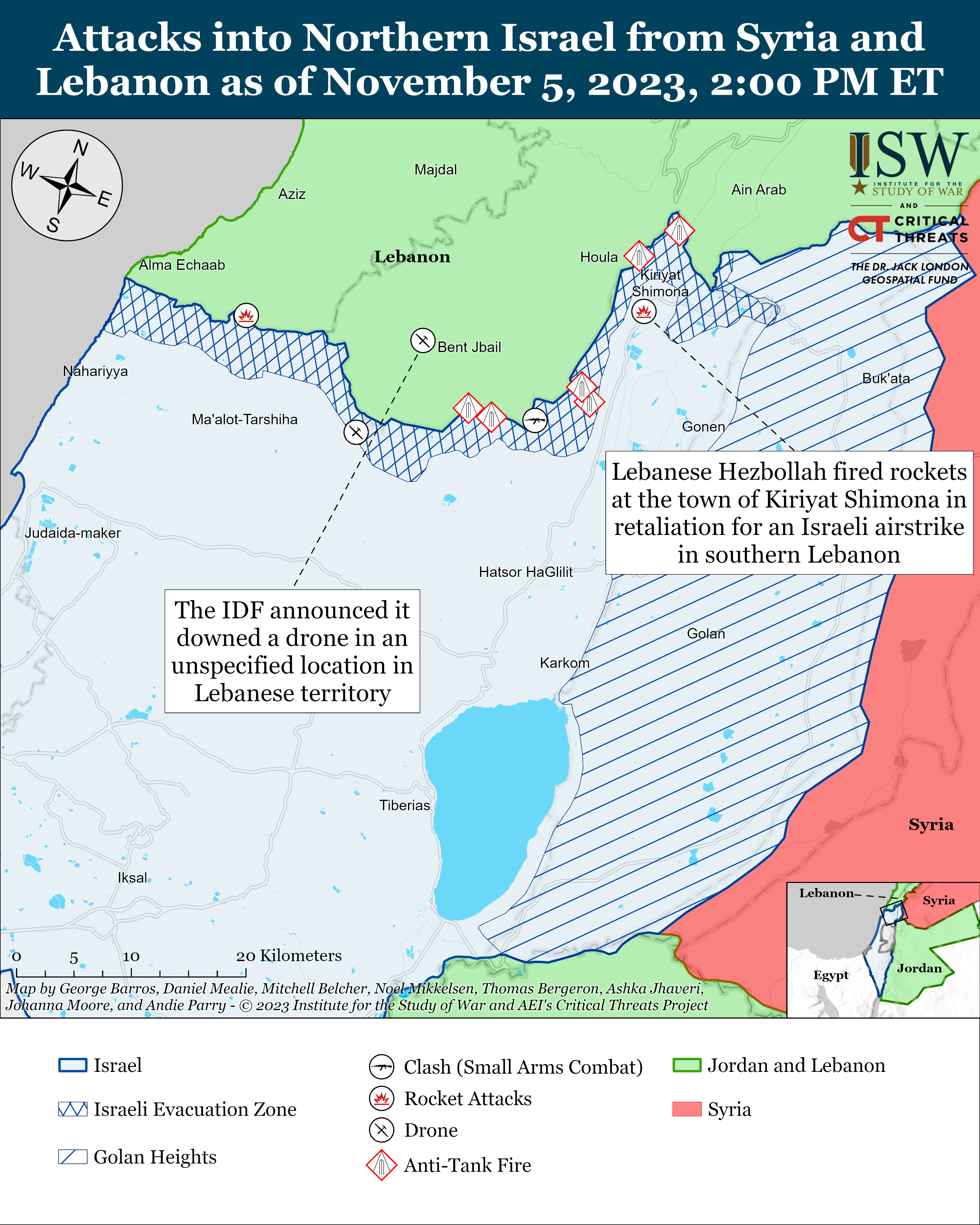
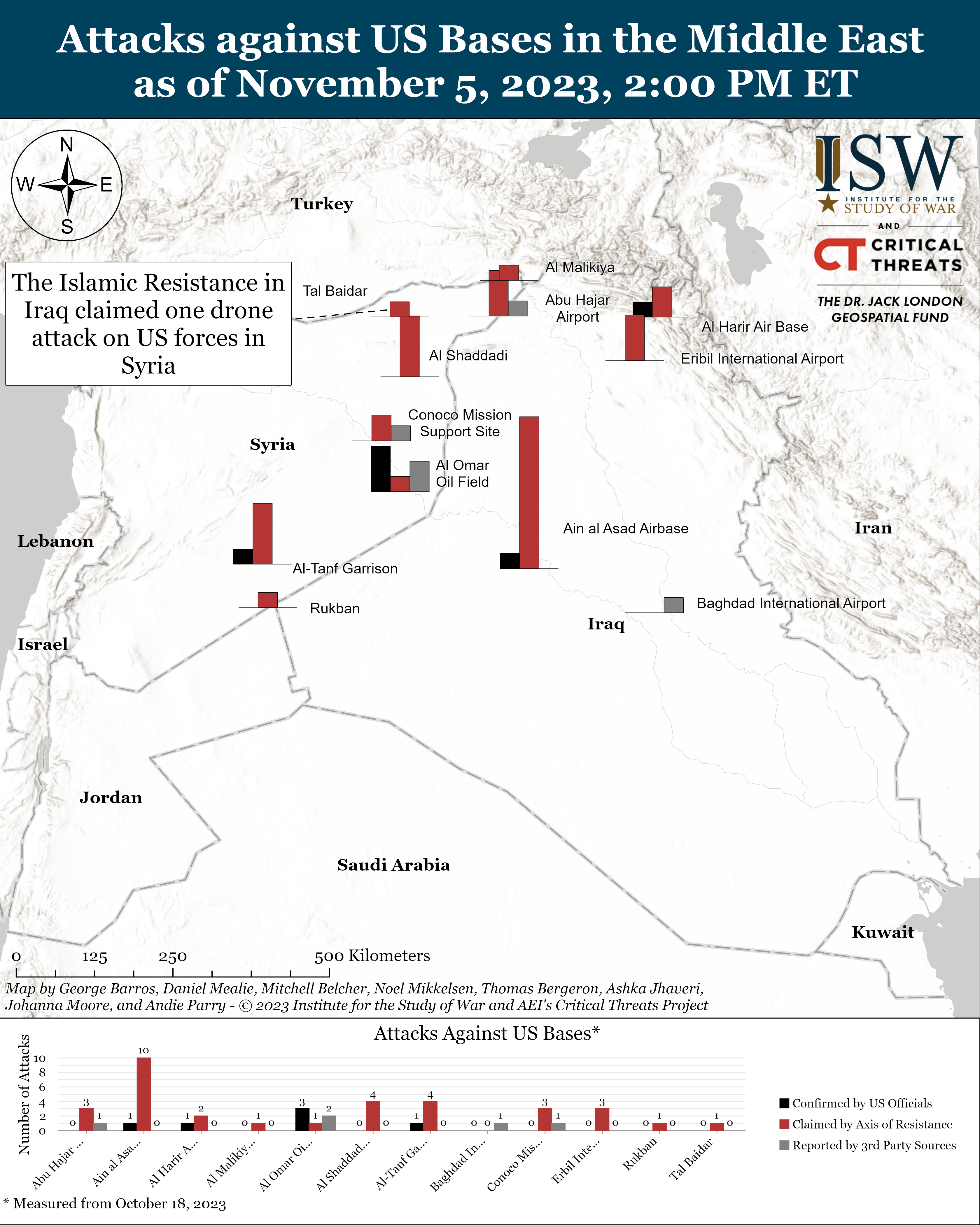
No comments:
Post a Comment